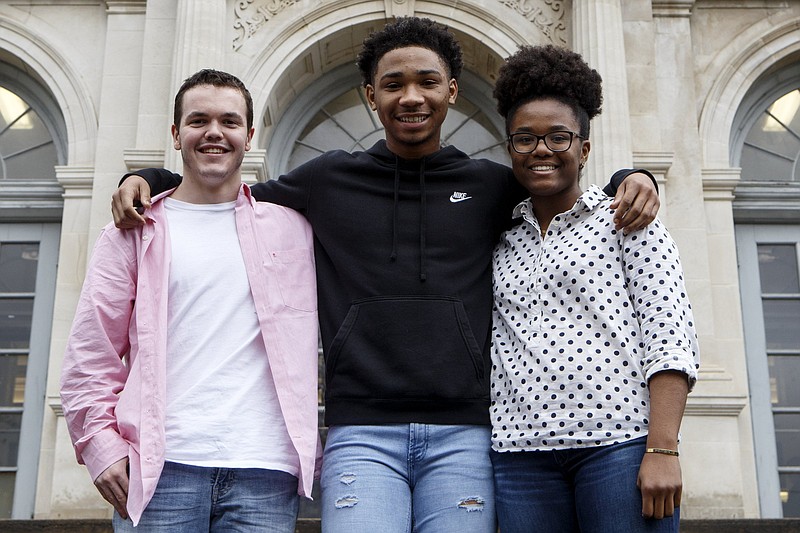A bill that would require every person in Tennessee with a driver's license to be automatically registered to vote when they turn 18 will appear before the Senate's State and Local Government Committee on Tuesday.
And traveling to Nashville to speak in the bill's favor will be three students from Chattanooga School for the Arts and Sciences.
But they aren't just pushing the bill because they agree with it.
They wrote it.
Brevin Sims, Fisher Latham and Lauren Tolbert participated in the Tennessee Bar Association's first annual Catalyst Program this year, which worked with high schools across the state to have students draft bills for sponsorship in the state legislature.
Their bill, Senate Bill 837, is sponsored by state Sen. Raumesh Akbari, D-Memphis, and the companion House Bill 1002 is sponsored by state Rep. Bill Beck, D-Nashville.
Tolbert and Latham said automatically registering eligible Tennesseans to vote when they get a driver's license, similar to how males are registered for the selective service, would help take away some of the hurdles that prevent people from registering.
"I think a lot of people want to get involved in the voting process. When people hear about elections and everyone is pushing them to vote, it's already too late to register," Tolbert said. "It takes away that one barrier that prevents people from being civically engaged."
Latham said he thinks it's just common sense.
"If you want to have a society full of civically engaged citizens, then why not make it one less barrier, one less step. You're not forcing people to vote, they still have that choice. I think it's kind of common sense.
The teens all agree the bill would especially benefit their peers, who often are excited to get their driver's license but don't know how to register to vote.
"I think people shy away from understanding politics because there are so many layers to it," Sims said. "The most important thing we have is a democracy, and the power does come from those who are governed."
The program was headed by the association's Young Lawyers Division and was meant to be more of a vessel to connect the students to state lawmakers, said Joycelyn Ashanti Stevenson, executive director of the Tennessee Bar Association.
"We are incredibly proud of our Young Lawyers Division through TBA for creating this program. We are very proud of the students from Chattanooga School for the Arts and Sciences who were involved. And no matter the outcome of the bill, we feel that this was a success because these students have had the opportunity to interact with the legislative system and see how government works," she said.
Sims, Latham and Tolbert were invited to participate in the project by teacher Kelly Davis, and they formed one of several groups researching and writing bills. About 20 CSAS students participated in the project and the school ultimately submitted five bills.
Davis said she's always excited to find unique opportunities for her students.
"I never say 'no.' I'm sure it'll be a good fit for someone," Davis said. She's been teaching many of her students for years at the school for sixth- through 12th-graders. It allows her to get to know their interests.
"I think the whole experience was fantastic from start to finish, I've had a lot of kids who have been engaged, but to actually look at this in the real world," she said. "It gives a real world experience for our kids."
Latham said the CSAS students who worked together didn't feel like it was a competition.
"We are all supportive of each other," he said. "We had one bill that would expand the blue light district from college campuses to city streets. The freshman bill was something like requiring all teachers to have CPR training and be certified."
The voter registration bill stemmed from Latham's interest in civic engagement and political activism, ideals to which Tolbert, one of the founders of the local student activist group Chattanooga Students Leading Change, is also devoted.
Sims also previously proposed a piece of legislation as part of a government class project and sent a letter to U.S. Sen. Lamar Alexander. He was shocked when he received a response.
"I'm one of those people who's very active in the community," Sims said. "I think it's important to use our voice."
Students from across the state who participated in the Tennessee Bar Association program already took one trip to the state Capitol to meet with local representatives and other participants in the program.
Latham said he felt lawmakers were more responsive to the bill because it was authored by students.
"They don't know anything about me, they just know I am some high school kid who wrote a bill with his peers and is going through the process," he said. "It's just a complete unique experience."
"It's kind of showing that the youth can get involved in state politics and government at a young age. That's part of the reason I'm really pushing for this is because I want to have hope, especially in a time when people are down about politics in general. This will be small but it can mean a lot."
Stevenson said that level of engagement made her optimistic.
"It makes me hopeful for the future of our state that these young people are already involved so early in their lives," she said.
Davis called the group "rock stars" and said that mindset of being engaged is why she was excited they had this opportunity. It's why she enjoys working with middle and high school students.
"High-schoolers are basically my favorite people in the world. I think they are and can be as informed, as intelligent, as engaged as adults. Sometimes because they are less jaded, because they believe a difference can be made, they are more powerful than adults."
Regardless of whether the bill makes it all the way into becoming law, the students say it's been an encouraging experience.
"We all wanted to take a chance and have our voice being heard,"Brevin said.
Contact staff writer Meghan Mangrum at mmangrum@timesfreepress.com or 423-757-6592. Follow her on Twitter @memangrum.

